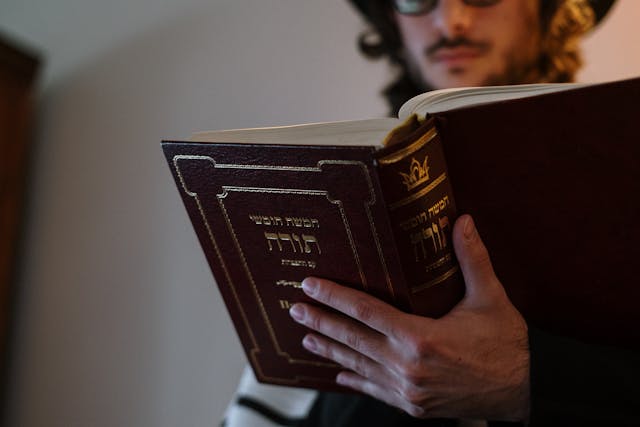I was recently contacted by a parent of someone who has recently become religious. They found me through my article on Aish Hatorah being a cult, and wanted me to intervene. This prompted me to think about what I’d actually say to someone who was actively involved in becoming Orthodox Jewish, or considering doing so.
Contrary to how I might come across on this site, and maybe as a result of personal growth and healing over the years, I’d consider myself quite open minded and tolerant of most individuals I encounter. It is easy for me to see how, considering all that they have experienced and believe, what they are doing feels like the best thing to be done.
My militant attitude is generally reserved for movements and ideologies, the philosophies that underlie the behaviors and beliefs that I find abhorrent (the exception I’d make is for leaders who are having an outsized impact and influence on others, like Noah Weinberg or my father). Thus, I can hang out with aishYeshiva Aish Hatorah, also known as Aish, is a cult educatio... More Rabbis, former friends of mine, and get along with them just fine – as long as we avoid key topics where we don’t see eye to eye.
With that in mind, here’s what I’d say to any adult who is in the process of becoming religious:
Knock yourself out.
You are an adult, you get to make your own choices. It would be disrespectful of me to think that I need to protect you from your own decisions, to not trust your judgement, to believe that I could convince you otherwise. As a consenting adult, even if I feel that you’re screwing up your life, it is also my belief that you can screw yourself in whichever way you like.
The most I can do is try assist you in making an informed decision and in considering aspects of this process you might not be aware of which could impact both your future and the lives of other people.
Here are the five main points make:
1. It’s All a Show
The beautiful Jewish lifestyle, the happy families, the level of attention and support you are getting, it’s all an act. I was part of this act. My parents, especially my mother, was miserable. Their relationship sucked. My siblings and I were emotionally neglected both at school and at home. But when you came to our house for Shabbat, you’d only see smiling faces and you’d get showered with attention and good food.
I am not the exception. I can think of six different AishYeshiva Aish Hatorah, also known as Aish, is a cult educatio... More rabbis who are now divorced after preaching the secrets of happy marriage. And in their wake are affairs, cheating scandals, and unbelievable amount of hypocrisy – Rabbis doing things they’re preaching that others refrain from at all costs. The Orthodox Jewish lifestyle has proven unsustainable for many of its most ardent evangelists, but you’re only seeing a highly curated experience aimed at putting it all in the best possible light.
2. You’re Not Fully Informed
Just as the experiences and environment are being curated for you, so too is the information you have access to. Aish’s educational system was structured in a way where you encountered the fluffy pop psychology stuff first, then were taught more and more of the controversial ideas once you were “bought in”. I assure you, no matter how much you think you know, there are even more insane teachings within the same sources you’re being quoted inspiration from.
Judaism is a religion that’s over 2,000 years old, and Orthodoxy is predicated on evolving as little as possible from its ancient origins. Thus, everything from a husband owning his wife, slavery being condoned, and gays being sentenced to death by stoning are all part of the parcel. You may have heard apologetic explanations for any one of these issues, but I invite you to zoom out and see the bigger picture. Why do so many different things need to be individually explained away?
I also invite you to note the individual examples of real-life people who are currently suffering from these laws: agunot and repressed homosexuality are two real-world tragedies that are wrought at the hands of Orthodoxy as a result of these beliefs.
3. Beware Irreversible Decisions
It’s your life, and you should be allowed to live it as you wish. You should also be allowed to adjust and change things as you reach new understandings or different conclusions. Alas, much of the Orthodox philosophy and lifestyle revolves around locking you in as soon and as much as possible into your choice, making future changes very difficult.
At the forefront of this is the pressure to get married and have children. This might be framed in many ways, from “fulfilling your purpose” to “the most meaningful thing you can do”. Regardless, by doing so, you’ll be tying yourself ot another human with specific world views, and then to children to whom you’ll need to maintain your appearances. Custody battles involving religion do not end well, see the movie “One of Us” for some examples of how people who leave religion are treated and are forced to behave. I know multiple people who must either put on act when their children, or are pretending to be religious so their family doesn’t fall apart.
4. The Impact on Others
Speaking of children, I believe one of the most morally difficult aspects of becoming religious is the almost inevitable fact that you’ll be involving unconsenting minors in this lifestyle when you have your own kids and raise them religious. To be a religious child is to be forced to comply with a variety of laws and social norms that are far more restrictive than is available in regular society. The more religiously a child is raised, the less general education they will receive and the less opportunities they will have access to.
Many of the people I have interviewed on my podcast who were raised religious and have since left, have shared how much they struggled with a lack of autonomy, being forced to conform to laws and behaviors that didn’t align with their own preferences. They talk about living with perpetual fear of hell, of punishment in this world and the next, of being doomed to get things wrong without having the tools or the abilities to get it right.
Do what you want in your own life. But bear in mind the consequence it will have if you choose to raise children in this lifestyle. (As an aside, it’s worth knowing that Ba’alei Teshuva have a higher chance of their children not staying religious. This is related to a variety of factors, including a difficulty in fitting in, the mixed cultures that Ba’alei Teshuva typically embody, and the fact that they’re actually exhibiting the same traits you probably are – independent thinking and rebellious nonconformity)
5. Moral Injury
If I had to ask you to beware of just one thing on your journey, it would be this: beware the loss of your own moral compass. Religion claims to be a framework within which you must suspend your own judgement and align yourself to the details outlined by a higher power. You might be drawn to religion right now because your intuition tells you it is the correct thing for you. Very well. Don’t stop listening to your intuition. If at any point part of you starts shouting at you to get out, don’t ignore it.
Don’t let others, whether it’s a fancy rabbi with a big long beard, a smiling woman in a wig explaining how Judaism is actually feminist, or the almighty Himself, persuade you not to listen to your heart.
I watched my parents make the difficult decision to become religious and settle halfway around the world. Then I watched them stay in the same neighborhood for 35 years even as it went to hell, ignoring the myriad cries for help that myself and my siblings exhibited. To me, they made one leap and then became complacent. Do not stop making the difficult choices, not now, and not later.
If you are disturbed by how Judaism treats gays, treats women. Why women can’t be rabbis or can’t pass their baby to their husband when they are menstruating or need to show their underwear to a rabbi if they spot. Don’t stop being disturbed. Don’t let an articulate, patient, charismatic young rabbi in a polo shirt with a wide disarming smile convince you that this is not insane.
My most traumatic memories from my years of being religious was when I acted against my better instincts, and religion was usually a key factor in my behavior. Others I have interviewed have shared similar experiences. The name for this is Moral Injury, when you act against your better judgement, either as a perpetrator or a powerless victim.
I trust you. I trust that right now you are making decisions that are best for you, even if I don’t agree with them. And I trust that in the future you will continue to make decisions that feel right to you, even when it’s hard. Even if others who you’ve surrounded yourself with don’t agree with them.
The Torah says “and you shall not stray after your heart, and after your eyes, which you are whoring after.” I say, do not listen to any verse that tells you not to listen to your heart, nor any book that contains such a verse. Do not listen to an ideology that has so little respect for your own faculties and freedom of thought.
I say, listen to your heart.













